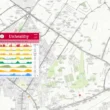The Sindh government has issued a directive to public transporters, urging them to reduce their fares in response to the recent decrease in the price of petroleum products during the latest fortnightly review. In a letter addressed to the transporters, the provincial authority highlighted the reduction in fuel prices and emphasized the need for corresponding fare reductions.
Following the government’s decision to reduce petrol prices to Rs272 per litre, diesel to Rs258 per litre, kerosene to Rs164.07 per litre, and light diesel oil to Rs152.68 per litre, the Sindh government called upon public transport operators to promptly implement fare adjustments. The letter stated that failure to comply with the directive would result in strict action being taken against non-compliant transporters.
While the move has been appreciated by citizens in Karachi who heavily rely on public transport, there are concerns regarding the effectiveness of these directions on transporters. Imran Ismail, a daily commuter traveling from Malir to II Chundrigar Road, expressed skepticism, stating that bus fares had already increased by approximately 40% due to the challenging economic situation.
Karachi residents have been burdened by soaring prices of essential commodities, as inflation has reached a historic high of 36.4%, making it the fastest-growing inflation rate in South Asia, surpassing even the economically distressed nation of Sri Lanka.
Khateeb Ahmed, a journalist who commutes from North Nazimabad to Guru Mandir, pointed out the recurring pattern of transporters raising fares in response to hikes in petroleum prices, but failing to lower them when fuel prices decrease. Ahmed, who frequently uses qingqi rickshaws for transportation, called for the government to establish a reasonable and affordable fare structure that benefits both commuters and transport operators.
He urged the government to ensure that its directives regarding fare reductions are diligently followed, as it would significantly alleviate the burden on the inflation-stricken masses.











